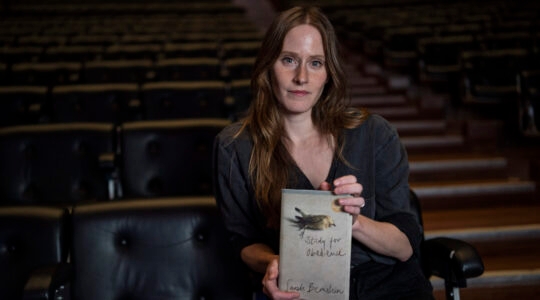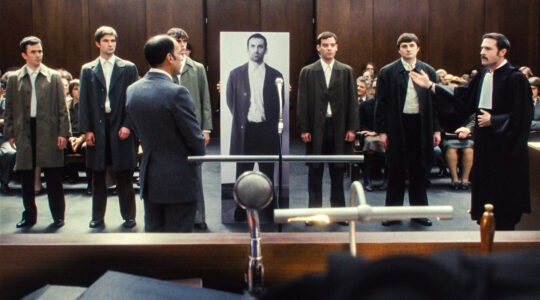Some supporters of the Israeli settlement movement are once again waging a smear campaign against JTA over its reporting on Jewish extremists in the West Bank.
At issue is the widely reported allegation that during a surprise Dec. 4, 2008 evacuation of Jewish families living in a disputed four-story building an Israeli police officer was injured by acid thrown into his eyes.
The Jerusalem Post recently reignited the controversy with an article saying that its initial report on the acid incident — echoed by several media outlets — was "unsubstantiated."
According to the Post, the police spokesman on the scene who first provided the information stood by his story, saying it was based on information that he received from a medic who was also there. But, the newspaper reported, the spokesman "did not know what medical diagnosis had been reached by hospital doctors who later treated the policeman." In addition, police say that none of the people arrested at the scene were charged for acid attacks.
JTA is committed to reporting the truth, and correcting the record if we get it wrong. As we stated back in October, we continue to believe that this this a case where readers are left with a choice: believe some police officials on the scene who said an officer was injured by acid or believe activists who were not on the scene who say the police were making it up.
More importantly, though, we continue to believe that the focus on this particular detail is obscuring the larger point: a small, many would say fringe, group of settlers is becoming increasingly militant in its opposition to the Israeli government.
The Post may no longer be sure if a police officer had acid thrown in his eyes. But here’s what the newspaper is continuing to report about the events of Dec. 4, 2008 (emphasis mine):
Thirty people were arrested on the day of the evacuation and in the days leading up to it. Since then, 20 suspects have been indicted on charges ranging from assaulting an officer to interfering with a police officer and preventing him from carrying out his duties. …
Twenty-three activists and four police officers sustained light and moderate injuries during the operation. The bulk of the activists resisted the evacuation non-violently.
Once the building was cleared, police told reporters the situation could have taken a more violent turn and displayed to reporters home-made weapons they had found in the house — including 30 potatoes laced with nails as well as a stockpile of home-cleaning detergents, which they said they suspected had been assembled for possible use against security personnel.
And then there were the attacks — Israel’s prime minister called them a "pogrom" — carried out soon after by some settlers against Palestinians:
After the evacuation, settler youths took over a Palestinian home in a nearby valley situated between Kiryat Arba and Hebron. They also lit a fire that threatened a Palestinian home nearby.
Settlers and Palestinians pelted one another with rocks, and another group of settlers entered the Palestinian-controlled part of Hebron and set fire to at least three cars.
In the most serious incident, a 51-year-old settler from Kiryat Arba allegedly shot and wounded two Palestinian men during a confrontation in Hebron.
The alleged gunman, Ze’ev Braude, was arrested, but state prosecutors later dropped charges of aggravated assault against him after Braude’s defense attorney demanded that a witness to the shooting who is an undercover member of thesecurity forces testify in the trial.
State prosecutors said the exposure of the witness would harm national security, and dropped charges against Braude so that the witness would not have to come forward.
It is all part of what some radical settlers call the “price tag” strategy, the goal of which is to respond to any move by the Israeli government against illegal settlements with mayhem and violence against Israeli security personnel and Palestinians.
To be sure, as we have made clear in our reporting, these attacks are being carried out by a small number of radical youth, encouraged by a small number of veteran settler leaders. Their actions are not endorsed or condoned by the majority of settler leaders or the wider settler population.
As for our critics, I’m not sure. They simply dispute the details regarding one incidnet, ignoring the question of whether they support or object to the attacks by Jewish extremists against Israeli security personnel and Palestinian civilians.
For those looking for a broader understanding of the issue, please check out our three-part investigation, "Special Report: Jewish Extremists":
- "Some Jewish settlers turning against Israel"
- "The view from a West Bank hilltop"
- "Israel wrestles with settler challenge"

Help ensure Jewish news remains accessible to all. Your donation to the Jewish Telegraphic Agency powers the trusted journalism that has connected Jewish communities worldwide for more than 100 years. With your help, JTA can continue to deliver vital news and insights. Donate today.





